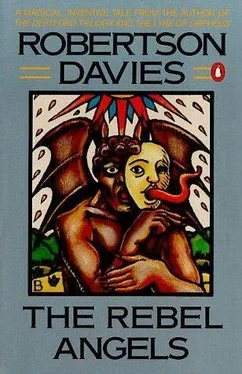Robertson Davies - The Rebel Angels
Здесь есть возможность читать онлайн «Robertson Davies - The Rebel Angels» весь текст электронной книги совершенно бесплатно (целиком полную версию без сокращений). В некоторых случаях можно слушать аудио, скачать через торрент в формате fb2 и присутствует краткое содержание. Жанр: Триллер, на английском языке. Описание произведения, (предисловие) а так же отзывы посетителей доступны на портале библиотеки ЛибКат.
- Название:The Rebel Angels
- Автор:
- Жанр:
- Год:неизвестен
- ISBN:нет данных
- Рейтинг книги:5 / 5. Голосов: 1
-
Избранное:Добавить в избранное
- Отзывы:
-
Ваша оценка:
- 100
- 1
- 2
- 3
- 4
- 5
The Rebel Angels: краткое содержание, описание и аннотация
Предлагаем к чтению аннотацию, описание, краткое содержание или предисловие (зависит от того, что написал сам автор книги «The Rebel Angels»). Если вы не нашли необходимую информацию о книге — напишите в комментариях, мы постараемся отыскать её.
The Rebel Angels — читать онлайн бесплатно полную книгу (весь текст) целиком
Ниже представлен текст книги, разбитый по страницам. Система сохранения места последней прочитанной страницы, позволяет с удобством читать онлайн бесплатно книгу «The Rebel Angels», без необходимости каждый раз заново искать на чём Вы остановились. Поставьте закладку, и сможете в любой момент перейти на страницу, на которой закончили чтение.
Интервал:
Закладка:
"I wish you wouldn't be facetious."
"Perfectly true, I assure you. I know the kind of thing you mean: Henry Hudson's lost diary; James Macpherson's Journal about the composition of Ossian – that kind of thing. And stuff does turn up. Look at the big haul of Boswell papers, found in a trunk in an attic in Ireland. Was this something of that order?"
"Yes. It was Rabelais' Stratagems."
"Don't know them."
"Neither does anybody else. But Rabelais was historiographer to his patron Guillaume du Bellay and as such he wrote Stratagems, that is to say, prowesses and ruses of war of the pious and most famous Chevalier de Langey at the beginning of the Third Caesarean War; he wrote it in Latin, and he also translated it into French, and it was supposed to have been published by his friend the printer Sebastian Gryphius, but no copy exists. So was it published or wasn't it?"
"And this was it?"
"This was it. It must have been the original script from which Gryphius published, or expected to publish, because it was marked up for the compositor – in itself an extraordinarily interesting feature."
"But why hadn't anybody spotted it?"
"You'd have to know some specialized facts to recognize it, because there was no title page – just began the text in close writing which wasn't very distinguished, so I suppose the calligraphy people hadn't paid it much heed."
"A splendid find, obviously."
"Of course Cornish didn't know what it was, and I never had a chance to tell him; I wanted to have a really close look at it."
"And you didn't want Urky to get in before you?"
"He is a Renaissance scholar. I suppose he had as good a right as anyone to the Gryphius MS."
"Yes, but you didn't want him to become aware of any such right. I quite understand. You don't have to be defensive."
"I would have preferred to make the discovery, inform Cornish (who after all owned the damned thing), and leave the disposition of it, for scholarly use, to him."
"Don't you think Cornish would have handed it over to Urky? After all, Urky regards himself as a big Rabelais man."
"For God's sake, Darcourt, don't be silly! McVarish's ancestor – if indeed Sir Thomas Urquhart was his ancestor, which I have heard doubted by people who might be expected to know – Sir Thomas Urquhart translated one work – or part of it – by Rabelais into English, and plenty of Rabelais scholars think it is a damned bad translation, full of invention and whimsy and unscholarly blethering just like McVarish himself! There are people in this University who really know Rabelais and who laugh at McVarish."
"Yes, but he is a Renaissance historian, and this was apparently a significant bit of Renaissance history. In Urky's field, and not really in your field. Sorry, but that's the way it looks."
"I wish people wouldn't talk about fields as if we were all a bunch of wretched prospectors and gold-panners, ready to shoot anybody who steps on our claim."
"Well, isn't that what we are?"
"I suppose I've got to tell you the whole thing."
"I wish you would. What have you been holding back?"
"There was the MS of the Stratagems, as I've told you. About forty pages, closely written. Not a good hand and no signature, except the signature that was written all over it – the lost Rabelais book. But in another little bundle in the back of the leather portfolio, in a sort of pocket, were the scripts of three letters."
"From Rabelais?"
"Yes, from Rabelais. They were drafts of three letters written to Paracelsus. His rough copies. But not so rough he hadn't signed them. Perhaps he enjoyed writing his name: lots of people do. It jumped at me off the page – that big ornate signature, not really the Chancery Hand, but a Mannerist style of his own -"
"Yes, Urky always insists that Rabelais was a Mannerist author."
"Urky be damned; he picked that up from me. He wouldn't know Mannerism in any art; he has no eye. But Rabelais is a Mannerist poet who happened to write in prose; he achieves in prose what Giuseppe Arcimboldo achieves in painting – fruitiness, nuttiness, leanness, dunginess, and the wildest kind of grotesque invention. But there were the letters, and there was the unmistakable, great signature. I had to take hold of myself not to fall on my knees. Think of it! Just think of it!"
"Very nice."
"Nice, you call it! Nice! Stupendous! I had a peep – the merest peep – and they contained passages in Greek (quotations, obviously) and here and there a few words in Hebrew, and half a dozen revealing symbols."
"Wholly revealing what?"
"Revealing that Rabelais was in correspondence with the greatest natural scientist of his day, which nobody knew before. Revealing that Rabelais, who was suspected of being a Protestant, was something at least equally reprehensible for a man of the Church – even a nusiance and a renegade – he was, if not a Cabbalist at least a student of Cabbala, and if not an alchemist at least a student of alchemy! And that is bloody well my field, and it could be the making of any scholar who got hold of it, and I'll be damned if I want that bogus sniggering son of a whore McVarish to get his hands on it!"
"Spoken like a true scholar!"
"And I think he has got his hands on it! I think that bugger has pinched it!"
"My dear man, calm down! If it did turn up it would have to go to the University Library, you know. I couldn't simply hand it over to you."
"You know how those things are done; a word to the Chief Librarian would be all that is necessary, and I wouldn't ask you to do it. I could do it myself. First crack at that MS – that's what I want!"
"Yes, yes, I understand. But I've got bad news for you. In one of Cornish's notebooks there's an entry that says "Lend McV. Rab. MS April 16". What do you suppose that tells us?"
"Lend. Lend – does that mean he meant to lend it or that he did lend it?"
"How do I know? But I'm afraid you're grasping at a straw. I suspect Urky has it."
"Pinched it! I knew it! The thief!"
"No, wait a minute – we can't jump to conclusions."
"I'm not jumping to anything. I know McVarish. You know McVarish. He winkled it out of Cornish and now he has it! The sodding crook!"
"Please, don't assume anything. It's simple; I have that entry, and I show it to McVarish and ask him for the MS back."
"Do you think you'll get it? He'll deny everything. I've got to have that MS, Darcourt. I might as well tell you, I've promised it to someone."
"Wasn't that premature?"
"Special circumstances."
"Now look here, Clem, I'm not being stuffy, I hope, but the books and manuscripts in Cornish's collection are my charge, and the circumstances have to be very special for you to talk about anything in that collection to anybody else until all the legal business has been completed and the stuff is safely lodged in the Library. What are these special circumstances?"
"Rather not say."
"I'm sure you'd rather not. But I think you should." Hollier squirmed in his chair. There is no other word for his uneasy twisting, as if he thought that a change of posture would help his inner unease. To my astonishment he was blushing. I didn't like it at all. His embarrassment was embarrassing me. When he spoke his manner was hangdog. The great Hollier, whom the President had described not long ago – to impress the government who were nagging about cutting our grants – as one of the ornaments of the University, was blushing before me. I'm not one of the ornaments myself (just a useful table-leg) and I am too loyal to the University to like watching an ornament squirm.
"A particularly able student – it would be the foundation of an academic career – I would supervise, of course -"
I have a measure of the intuition which common belief regards, quite unfairly, as being an attribute of women. I was ahead of him.
Читать дальшеИнтервал:
Закладка:
Похожие книги на «The Rebel Angels»
Представляем Вашему вниманию похожие книги на «The Rebel Angels» списком для выбора. Мы отобрали схожую по названию и смыслу литературу в надежде предоставить читателям больше вариантов отыскать новые, интересные, ещё непрочитанные произведения.
Обсуждение, отзывы о книге «The Rebel Angels» и просто собственные мнения читателей. Оставьте ваши комментарии, напишите, что Вы думаете о произведении, его смысле или главных героях. Укажите что конкретно понравилось, а что нет, и почему Вы так считаете.












